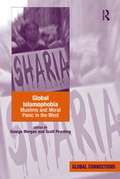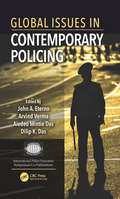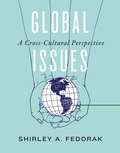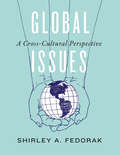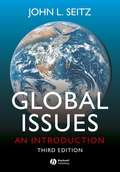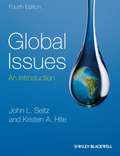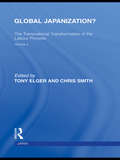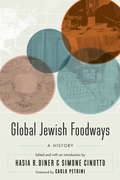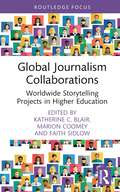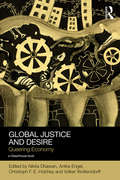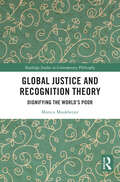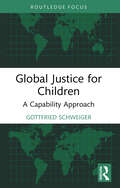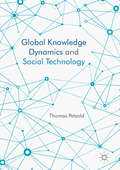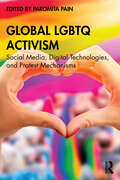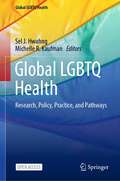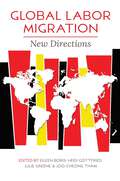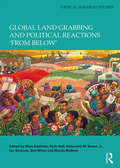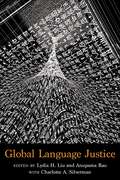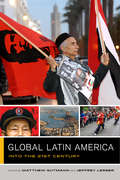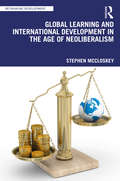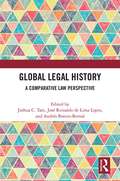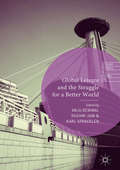- Table View
- List View
Global Islamophobia: Muslims and Moral Panic in the West (Global Connections)
by George MorganThe decade since 9/11 has seen a decline in liberal tolerance in the West as Muslims have endured increasing levels of repression. This book presents a series of case studies from Western Europe, Australia and North America demonstrating the transnational character of Islamophobia. The authors explore contemporary intercultural conflicts using the concept of moral panic, revitalised for the era of globalisation. Exploring various sites of conflict, Global Islamophobia considers the role played by 'moral entrepreneurs' in orchestrating popular xenophobia and in agitating for greater surveillance, policing and cultural regulation of those deemed a threat to the nation's security or imagined community. This timely collection examines the interpenetration of the global and the local in the West's cultural politics towards Islam, highlighting parallels in the responses of governments and in the worrying reversion to a politics of coercion and assimilation. As such, it will be of interest to scholars of sociology and politics with interests in race and ethnicity; citizenship and assimilation; political communication, securitisation and The War on Terror; and moral panics.
Global Issues in Contemporary Policing (International Police Executive Symposium Co-Publications)
by Arvind Verma Dilip K. Das John A. Eterno Aiedeo Mintie DasThis book addresses six areas of policing: performance management, professional and academic partnerships, preventing and fighting crime and terrorism, immigrant and multicultural populations, policing the police, and cyber-security. The book contains the most current and ground-breaking research across the world of policing with contributors from over 20 countries. It is also a suitable reference or textbook in a special topics course. It consists of edited versions of the best papers presented at the IPES annual meeting in Budapest.
Global Issues: A Cross-Cultural Perspective
by Shirley A. FedorakGlobal Issues is a pedagogically rich text that offers a unique way of looking at contemporary issues, such as food security and global conflict, from a cross-cultural and multidisciplinary perspective. By exploring each issue in depth, students gain an applied understanding of more abstract concepts like conflict, globalization, culture, imperialism, human rights, and gender, while the cross-cultural approach encourages students to view the world from outside the Western box. Designed for introductory-level students in global and international studies, human geography, anthropology, sociology, and development studies, this highly accessible text offers instructors and students a unique way of matching the concepts they learn in the classroom with important issues in the world in which they live and work.
Global Issues: A Cross-cultural Perspective
by Shirley A. FedorakGlobal Issues is a pedagogically rich text that offers a unique way of looking at contemporary issues, such as food security and global conflict, from a cross-cultural and multidisciplinary perspective. By exploring each issue in depth, students gain an applied understanding of more abstract concepts like conflict, globalization, culture, imperialism, human rights, and gender, while the cross-cultural approach encourages students to view the world from outside the Western box. Designed for introductory-level students in global and international studies, human geography, anthropology, sociology, and development studies, this highly accessible text offers instructors and students a unique way of matching the concepts they learn in the classroom with important issues in the world in which they live and work.
Global Issues: An Introduction (3rd edition)
by John L. SeitzEmphasizing critical thinking, Seitz (government, emeritus, Wofford College) introduces some of the current global issues of our time: wealth and poverty, population, food, energy, the environment, technology, and alternative futures.
Global Issues: An Introduction (4th Edition)
by John L. Seitz Kristen A. HiteSeitz (emeritus, government, Wolford College) and Hite (climate change program, Center for International Environmental Law, and international Environmental Law, U. of Maryland) provide a much-updated fourth edition of their book on the most critical environmental, political, economic, and social issues facing the world today. General topics include population, wealth and poverty, food, energy, the environment, and technology. The authors also offer discussions of alternative futures. The new edition includes a new section focusing on nuclear energy. It is well-illustrated and referenced, and includes numerous suggestions for further reading. Annotation ©2012 Book News, Inc. , Portland, OR (booknews. com)
Global Issues: Challenges for the 21st Century
by Paula A. Franklin Norman LungerHigh School Social Studies Textbook
Global Issues: Challenges for the 21st Century
by Paula A. Franklin Norman LungerHigh School Social Studies Textbook
Global Japan: The Experience of Japan's New Immigrant and Overseas Communities
by Paul White Roger Goodman Ayumi Takenaka Ceri PeachThe Japanese have long regarded themselves as a homogenous nation, clearly separate from other nations. However, this long-standing view is being undermined by the present international reality of increased global population movement. This has resulted in the establishment both of significant Japanese communities outside Japan, and of large non-Japanese minorities within Japan, and has forced the Japanese to re-conceptualise their nationality in new and more flexible ways.This work provides a comprehensive overview of these issues and examines the context of immigration to and emigration from Japan. It considers the development of important Japanese overseas communities in six major cities worldwide, the experiences of immigrant communities in Japan, as well as assessing the consequences for the Japanese people's view of themselves as a nation.
Global Japanization?: The Transnational Transformation of the Labour Process (Routledge Library Editions: Japan)
by Tony ElgerGlobal Japaniziation? Brings together research from North America, Japan, Europe and Latin America to analyse the influence of Japanese manufacturing investment and Japanese working practices across the global economy. The editors present original case studies of work reorganization and workers’ experiences within both Japanese companies and those of their competitors in diverse sectors and national settings. These studies provide a wide-ranging critique of conventional accounts of Japanese models of management and production, and their implications for employees. They offer new evidence and fresh perspectives on the role of "transplants" in disseminating manufacturing innovations, and on the responses of non-Japanese firm in reorganizing production operations and industrial relations.
Global Jewish Foodways: A History (At Table)
by Hasia R. Diner Carlo Petrini Simone CinottoThe history of the Jewish people has been a history of migration. Although Jews invariably brought with them their traditional ideas about food during these migrations, just as invariably they engaged with the foods they encountered in their new environments. Their culinary habits changed as a result of both these migrations and the new political and social realities they encountered. The stories in this volume examine the sometimes bewildering kaleidoscope of food experiences generated by new social contacts, trade, political revolutions, wars, and migrations, both voluntary and compelled. This panoramic history of Jewish food highlights its breadth and depth on a global scale from Renaissance Italy to the post–World War II era in Israel, Argentina, and the United States and critically examines the impact of food on Jewish lives and on the complex set of laws, practices, and procedures that constitutes the Jewish dietary system and regulates what can be eaten, when, how, and with whom. Global Jewish Foodways offers a fresh perspective on how historical changes through migration, settlement, and accommodation transformed Jewish food and customs.
Global Journalism Collaborations: Worldwide Storytelling Projects in Higher Education (Routledge Focus on Journalism Studies)
by Katherine C. BlairGlobal Journalism Collaborations offers guidance on detailed ways to create collaborative international projects in the communications and journalism fields – a hot topic in higher education.The chapters are contributed by professors and journalists from around the world. The authors explain, step-by-step, the process of collaborating with students and instructors at universities in dozens of countries in order to produce digital storytelling projects that are streamed worldwide. The book will inspire academics and students in any discipline to develop and create their own collaborative projects by sharing lessons learned through case studies of successful global collaborations.This truly interdisciplinary work will interest scholars and instructors of journalism, media studies, mass communication, higher education and anyone working on collaborative projects across a variety of disciplines.
Global Justice and Desire: Queering Economy (Social Justice)
by Nikita Dhawan Antke Engel Christoph H.E. Holzhey Volker WoltersdorffEmploying feminist, queer, and postcolonial perspectives, Global Justice and Desire addresses economy as a key ingredient in the dynamic interplay between modes of subjectivity, signification and governance. Bringing together a range of international contributors, the book proposes that both analyzing justice through the lens of desire, and considering desire through the lens of justice, are vital for exploring economic processes. A variety of approaches for capturing the complex and dynamic interplay of justice and desire in socioeconomic processes are taken up. But, acknowledging a complexity of forces and relations of power, domination, and violence – sometimes cohering and sometimes contradictory – it is the relationship between hierarchical gender arrangements, relations of exploitation, and their colonial histories that is stressed. Therefore, queer, feminist, and postcolonial perspectives intersect as Global Justice and Desire explores their capacity to contribute to more just, and more desirable, economies.
Global Justice and Recognition Theory: Dignifying the World’s Poor (Routledge Studies in Contemporary Philosophy)
by Monica MookherjeeIn the light of intense international focus on ongoing forms of world poverty, this book examines the potential of the concept of recognition in contemporary political philosophy to respond morally to this dire condition. This book uses recognition theories to develop a two-tiered response to the problem of global poverty. First, it highlights non-degradation, non-humiliation and the avoidance of social suffering as essential components to the agency of the very poor. This runs counter to liberal arguments that focus only on the deficit of basic material interests. Second, even if universal conditions of agency are met, many of the world’s extreme poor may still suffer domination. The book argues that empowering the world’s poor to resist domination is an essential response to global poverty. By conceiving poverty in terms of agency and empowerment, this book highlights the transnational relevance of recognition theory to one of the most crucial problems affecting a rapidly globalizing world. Global Justice and Recognition Theory will be of interest to scholars and advanced students working in social and political philosophy, political theory, and global justice.
Global Justice for Children: A Capability Approach (Routledge Focus on Philosophy)
by Gottfried SchweigerWhile global justice is a hot topic in political philosophy, the place of children and children as a particular group of agents has been largely ignored. This book explores global justice for children from the perspective of the capability approach. The capability approach provides a fruitful normative foundation for exploring the issue of global justice for children. To spell this out, it is necessary to address the questions of the currency of justice, its principles, and the allocation of responsibility, and to show that all children have a moral claim to the capabilities and functionings they require for a sufficiently good life. The first chapters are devoted to the status of children in political philosophy and to methodological considerations. The next chapters then argue that developing capabilities and functionings constitute the appropriate currency of global justice. The discussion then turns to the question of the principle of global justice, advocating a sufficiency principle that recognizes different thresholds in order to secure a sufficiently good life for all children. Finally, the concluding chapters address the question of responsibility for justice. Here, the book develops a theory of differentiated responsibility, which distributes responsibilities among various agents.Global Justice for Children will be of interest to researchers and students working in social and political philosophy, ethics, philosophy of childhood and development studies.
Global Knowledge Dynamics and Social Technology
by Thomas PetzoldThis volume unpacks an intriguing challenge for the field of media research: combining media research with the study of complex networks. Bringing together research on the small-world idea and digital culture it questions the assumption that we are separated from any other person on the planet by just a few steps, and that this distance decreases within digital social networks. The book argues that the role of languages is decisive to understand how people connect, and it looks at the consequences this has on the ways knowledge spreads digitally. This volume offers a first conceptual venue to analyse emerging phenomena at the innovative intersection of media and complex network research.
Global LGBTQ Activism: Social Media, Digital Technologies, and Protest Mechanisms
by Paromita PainFocused on understanding and analyzing LGBTQ activism and protest globally, this edited collection brings together voices from different parts of the world to examine LGBTQ protests and their impact. Through the lens of media, culture, and sociopolitical structures, this collection highlights how cultural and technical factors like the emergence of social media and other digital platforms have impacted LGBTQ activism. This book draws on studies from countries as varied as Zimbabwe, Bangladesh, Sri Lanka, Hungary, Morocco, China, and the US. The contributions provide important insight into how social media and digital platforms have provided space for self-expression and protest and encouraged advocacy and empowerment for LGBTQ movements. It also examines the diversity and similarities between different national contexts and the various obstacles faced, while spotlighting countries that are traditionally understudied in Western academia, in an important step toward decolonizing research. Each chapter, through the voices of activists and media scholars, moves beyond an oversimplified examination of queer protests to show, in rich detail, the exciting yet complicated terrain of queer protests throughout the globe. This book is suitable for media, communication, and cultural studies students; researchers; academics; and LGBTQ activists, as well as students and scholars from related academic disciplines.
Global LGBTQ Health: Research, Policy, Practice, and Pathways (Global LGBTQ Health)
by Sel J. Hwahng Michelle R. KaufmanThis open access book is a groundbreaking volume that creates a new field within the intersection of “global health” and “LGBTQ health” delineating specific health challenges and resiliencies. There has been increasing awareness of the importance in recognizing LGBTQ health issues and disparities. However, there is a dearth of research and scholarship that examines LGBTQ health through global and comparative perspectives. This book addresses this gap.In the pursuit of scientific inquiry, the disciplines in public health have often emphasized reductionist perspectives that are particularized to a specific locale, municipality, or country. This book's provision of broader perspectives, cross-cutting disparities and issues, and socio-political-cultural contextualization inform the development of new research, policies, interventions, and programs. Students benefit by learning about LGBTQ health research, policies, and programs in various countries and regions. Public health researchers benefit by learning about research conducted in various countries and regions, along with understanding how research has been linked to and impacted by various policies and programs. Policymakers benefit from learning about overarching and comparative perspectives that could inform more effective policies, including those connected to multiple locations. Practitioners learn about various public health practices in multiple countries and regions that could contribute to novel and creative solutions and approaches within the respective contexts. The nine chapters of this volume facilitate greater socio-political-cultural awareness, sensitivity, and competence; undertake an in-depth literature review of health factors and outcomes; and provide recommendations for increasing health-related capacity through development and collaborations between agencies, organizations, and institutions across countries and/or regions. Global LGBTQ Health: Research, Policy, Practice, and Pathways is primarily intended for students and instructors in public health, medicine, nursing, other health professions, psychology, social work, LGBTQ or gender/sexuality studies, human rights, and the social sciences. The book is also a useful resource for public health researchers and practitioners, policymakers, and healthcare and social service providers.
Global Labor Migration: New Directions (Studies of World Migrations)
by Eileen Boris Bridget Anderson Pun Ngai Julie Greene Heidi Gottfried Judy Fudge Jenny Chan Rutvica Andrijasevic Radhika Natarajan Matt Withers Joo-Cheong Tham Nicola Piper Helen Sampson Katie Bales Penelope Ciancanelli Felipe Barradas Bastos Charlie Fanning Jorge L Giovannetti-Torres Justin Jackson Bastiaan Nugteren Jessica R Pliley Devi Sacchetto Yael SchacherAround the world, hundreds of millions of labor migrants endure exploitation, lack of basic rights, and institutionalized discrimination and marginalization. What dynamics and drivers have created a world in which such a huge--and rapidly growing--group toils as marginalized men and women, existing as a lower caste institutionally and juridically? In what ways did labor migrants shape their living and working conditions in the past, and what opportunities exist for them today? Global Labor Migration presents new multidisciplinary, transregional perspectives on issues surrounding global labor migration. The essays go beyond disciplinary boundaries, with sociologists, ethnographers, legal scholars, and historians contributing research that extends comparison among and within world regions. Looking at migrant workers from the late nineteenth century to the present day, the contributors illustrate the need for broader perspectives that study labor migration over longer timeframes and from wider geographic areas. The result is a unique, much-needed collection that delves into one of the world’s most pressing issues, generates scholarly dialogue, and proposes cutting-edge research agendas and methods. Contributors: Bridget Anderson, Rutvica Andrijasevic, Katie Bales, Jenny Chan, Penelope Ciancanelli, Felipe Barradas Correia Castro Bastos, Eileen Boris, Charlie Fanning, Judy Fudge, Jorge L. Giovannetti-Torres, Heidi Gottfried, Julie Greene, Justin Jackson, Radhika Natarajan, Pun Ngai, Bastiaan Nugteren, Nicola Piper, Jessica R. Pliley, Devi Sacchetto, Helen Sampson, Yael Schacher, Joo-Cheong Tham, and Matt Withers
Global Land Grabbing and Political Reactions 'from Below' (Critical Agrarian Studies)
by Wendy Wolford Ian Scoones Ruth Hall Ben White Saturnino M. Borras Jr. Marc EdelmanWhen the 2007-2008 food and financial crises triggered a global wave of land grabbing, scholars, activists and policy practitioners assumed that this would be met with massive peasant resistance. As empirical evidence accumulated, however, it became clear that political reactions ‘from below’ to land grabbing were quite varied and complex. Violent resistance, outright expulsions, everyday ‘weapons of the weak’ and demands for better terms of incorporation into land deals were among the outcomes that emerged. Readers of this collection will encounter a multinational group of scholars who use the tools of social movements theory and critical agrarian studies to examine cases from Argentina, Mexico, Guatemala, Nicaragua, Colombia, Ethiopia, Madagascar, Mozambique, Uganda, Mali, Ukraine, India, and Laos, as well as the Rio +20 Sustainable Development Conference. Initiatives ‘from below’ in response to land deals have involved local and transnational alliances and the use of legal and extra-legal methods, and have brought victories and defeats. This book was first published as a special issue of The Journal of Peasant Studies.
Global Language Justice
by Liu, Lydia H.; Rao, AnupamaMore than 40 percent of the world’s estimated 7,100+ languages are in danger of disappearing by the end of this century. As with the decline of biodiversity, language loss has been attributed to environmental degradation, developmentalism, and the destruction of Indigenous communities. This book brings together leading experts and younger scholars across the humanities and social sciences to investigate what global language justice looks like in a time of climate crisis. Examining the worldwide loss of linguistic diversity, they develop a new conception of justice to safeguard marginalized languages.Global Language Justice explores the socioeconomic transformations that both accelerate the decline of minoritized languages and give rise to new possibilities through population movement, unexpected encounters, and technological change. It also critically examines the concepts that are typically deployed to defend linguistic diversity, including human rights, inclusiveness, and equality. Contributors take up topics such as mapping language communities in New York City or how Indigenous innovation challenges notions of linguistic purity. They demonstrate the need to reckon with linguistic diversity in order to achieve a sustainable global economic system and show how the concept of digital vitality can push language justice in new directions. Interspersed with their essays are multilingual works by world-renowned poets and artists that engage with and deepen the book’s themes. Integrating ambitious theoretical exploration with concrete solutions, Global Language Justice offers vital new perspectives on the place of linguistic diversity in ongoing ecological crises.
Global Latin America: Into the Twenty-First Century
by Matthew C. Gutmann Jeffrey LesserLatin America is home to emerging global powers such as Brazil and Mexico and has important links to other titans including China, India, and Africa. Global Latin America examines a range of historical events and cultural forms in Latin America that continue to influence peoples' lives far outside the region. Its innovative essays, interviews, and stories focus on insights from public intellectuals, political leaders, artists, academics, and activists from the region, allowing students to gain an appreciation of the global relevance of Latin America in the twenty-first century.
Global Learning and International Development in the Age of Neoliberalism (Rethinking Development)
by Stephen McCloskeyThis book argues that the international development sector is in crisis which can be mostly sourced to its side-stepping the dominant development question of our age, the neoliberal growth paradigm. It argues that this crisis can be addressed, at least in part, by the sector’s re-engagement with the radical development education process that it helped to foster and sustain for over two decades. The recent safeguarding scandal is symptomatic of a sector that is becoming overly hierarchical, brand conscious and disconnected from its base. This book argues that many of the problems the sector is facing can be sourced to its failings in grappling with the question of neoliberalism and formulating a coherent critique of how market orthodoxy has accelerated poverty in the global North and South. This book recommends re-embracing the radical origins of global learning, situated in the participative methodology and praxis (reflection and action) of Paulo Freire, both as internal capacity-building and external public engagement. The book proposes a new development paradigm, focusing on bottomup, participative approaches to policy-making based on the needs of those NGOs claim to represent – the poor, marginalised and voiceless – rather than constantly following the agenda of donors and governments. The recommendations made by this book will serve as an important resource for researchers and students of international development and global learning, as well as to NGOs, civil society activists and education practitioners looking for solutions to the problems within the sector.
Global Legal History: A Comparative Law Perspective
by Joshua C. Tate José Reinaldo de Lima Lopes Andrés Botero-BernalThis collection brings together a group of international legal historians to further scholarship in different areas of comparative and regional legal history. Authors are drawn from Europe, Asia, and the Americas to produce new insights into the relationship between law and society across time and space. The book is divided into three parts: legal history and legal culture across borders, constitutional experiences in global perspective, and the history of judicial experiences. The three themes, and the chapters corresponding to each, provide a balance between public law and private law topics, and reflect a variety of methodologies, both empirical and theoretical. The volume highlights the gains that may be made by comparing the development of law in different countries and different time periods. The book will be of interest to an international readership in Legal History, Comparative Law, Law and Society, and History.
Global Leisure and the Struggle for a Better World (Leisure Studies in a Global Era)
by Karl Spracklen Anju Beniwal Rashmi JainThis edited collection highlights the diversity and reach of global leisure studies and global leisure theory. It explores the impact of globalization on leisure, and the sites of resistance and accommodation found in local, virtual and global leisure spaces.Unlike any other collection on leisure studies, Global Leisure and the Struggle for a Better World is truly representative of the diversity of the large and growing leisure scholarship across the globe. It demonstrates how researchers in leisure studies and sociology of leisure are applying complex theory to their work, and how a new theory of global leisure is emerging.
